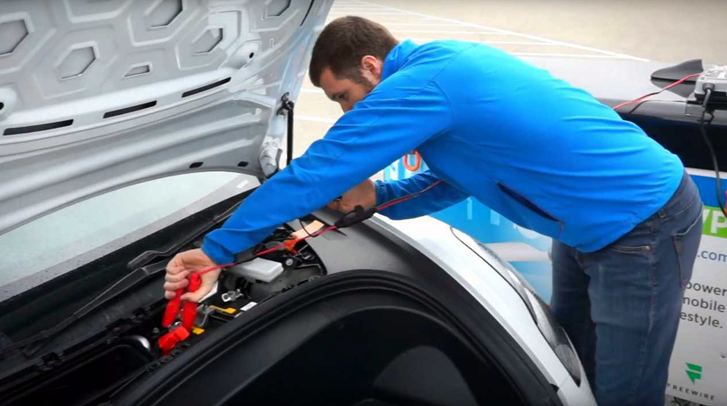Lithium Iron Phosphate Battery: In-depth Analysis of its Technical Principles and Characteristics
Lithium iron phosphate battery, as an important type of lithium-ion battery, has occupied a place in the field of energy storage since its birth due to its unique performance advantages. This article will thoroughly analyze the technical principles, structural characteristics and significant features of LFPB, but will not cover specific application areas and future prospects.
Technical Principles and Structural Features
The lithium iron phosphate battery, whose full name is lithium iron phosphate lithium-ion battery, is based on the use of lithium iron phosphate (LiFePO?) as the positive electrode material, while the negative electrode is usually made of carbon (graphite) material. The design of this battery allows its single cell nominal voltage to reach 3.2V, and the charge cut-off voltage is controlled between 3.6V and 3.65V.

From the perspective of battery structure, the left side of the lithium iron phosphate battery is the olivine-structured LiFePO? positive electrode material, which is connected to the positive electrode of the battery by aluminum foil; the right side is the carbon (graphite) negative electrode, which is connected to the negative electrode of the battery by copper foil. In the middle is a polymer separator, which effectively separates the positive electrode from the negative electrode, but allows lithium ions to pass through, but not electrons. The battery is filled with electrolyte and sealed with a metal case to ensure the safety and stability of the battery.
During the charging and discharging process, the operating principle of lithium iron phosphate batteries depends on the migration of lithium ions. During charging, some lithium ions in the positive electrode LiFePO? are released, transferred to the negative electrode through the electrolyte and embedded in the carbon material of the negative electrode; at the same time, the electrons released from the positive electrode flow to the negative electrode through the external circuit to maintain the balance of the chemical reaction. During discharge, the process is reversed. Lithium ions are released from the negative electrode and return to the positive electrode through the electrolyte. At the same time, electrons are released from the negative electrode and flow to the positive electrode through the external circuit to supply energy to the outside world.
Key Features
Lithium Iron Phosphate battery can stand out among many lithium-ion batteries mainly because of the following significant features:
High operating voltage and high energy density: The single cell nominal voltage of LFPB reaches 3.2V, and it has high energy density, which means it can store more electrical energy in the same volume or weight.
Long cycle life: Compared with other types of lithium-ion batteries, lithium iron phosphate batteries have a longer cycle life, generally reaching more than 2,000 times, and even more than 3,500 times under certain conditions. This long life characteristic makes it more advantageous in situations where frequent charging and discharging is required.
Excellent safety performance: The P-O bond in the lithium iron phosphate crystal structure is stable and difficult to decompose. Even under high temperature or overcharge conditions, it will not easily experience thermal runaway or form strong oxidizing substances like materials such as lithium cobalt oxide. This makes lithium iron phosphate batteries particularly safe.
Low self-discharge rate and no memory effect: The self-discharge rate of lithium-iron-phosphate batteries is relatively low, and there is no common memory effect such as nickel-metal-hydride and nickel-cadmium batteries. This means that users can charge and discharge the battery at any time without worrying about the loss of battery capacity.
Environmentally friendly: Lithium Iron Phosphate batteries do not contain any heavy metal elements that are harmful to the human body and are considered to be green and environmentally friendly battery products. It complies with European RoHS regulations, does not pollute the environment, and meets the current global requirements for energy conservation, emission reduction and sustainable development.

Technical Challenges and Improvement Directions
Although lithium iron phosphate batteries have many advantages, they also face some technical challenges. These include poor performance at low temperatures, low tap density of positive electrode materials, and high material preparation and battery manufacturing costs. To overcome these challenges, researchers are constantly exploring new synthesis methods and modification technologies to improve the overall performance of LFP batteries.
In summary, as an important type of lithium-ion battery, lithium iron phosphate battery has wide application prospects in the field of energy storage. With the continuous advancement of technology and further cost reduction, it is believed that LFPB will bring its unique advantages to more fields.
-
 The LiFePO4 battery, or lithium iron phosphate battery, is a type of rechargeable battery that has gained popularity in recent years due to its high energy density, long cycle life, and improved safety compared to other lithium-ion batteries. One of the key factors that make LiFePO4 batteries attractive to consumers is their durability and longevity. In this article, we will...Læs mere
The LiFePO4 battery, or lithium iron phosphate battery, is a type of rechargeable battery that has gained popularity in recent years due to its high energy density, long cycle life, and improved safety compared to other lithium-ion batteries. One of the key factors that make LiFePO4 batteries attractive to consumers is their durability and longevity. In this article, we will...Læs mere -
 In recent years, the development and advancements in lithium battery technology have revolutionized various industries, and the military sector is no exception. The utilization of lithium batteries in military equipment has provided numerous advantages, enhancing soldiers' capabilities and improving overall operational efficiency. This article aims to explore the significant impact of lithium batteries on military equipment. Lithium batteries have...Læs mere
In recent years, the development and advancements in lithium battery technology have revolutionized various industries, and the military sector is no exception. The utilization of lithium batteries in military equipment has provided numerous advantages, enhancing soldiers' capabilities and improving overall operational efficiency. This article aims to explore the significant impact of lithium batteries on military equipment. Lithium batteries have...Læs mere -
 In this fast-paced world, where technology is evolving at an unprecedented rate, energy storage solutions have become a necessity. Whether it is for powering our homes, vehicles, or even our gadgets, we rely heavily on batteries. One such remarkable innovation is the high-capacity 12V LiFePO4 battery with 100Ah. This advanced battery technology has revolutionized the way we store and utilize...Læs mere
In this fast-paced world, where technology is evolving at an unprecedented rate, energy storage solutions have become a necessity. Whether it is for powering our homes, vehicles, or even our gadgets, we rely heavily on batteries. One such remarkable innovation is the high-capacity 12V LiFePO4 battery with 100Ah. This advanced battery technology has revolutionized the way we store and utilize...Læs mere -
 Trains are a vital mode of transportation for people and goods across the world. They offer a reliable, efficient, and cost-effective means of transport for commuters, freight, and other forms of cargo. However, the smooth operation of trains depends on several components, one of which is the locomotive starter battery. The locomotive starter battery is a critical component that...Læs mere
Trains are a vital mode of transportation for people and goods across the world. They offer a reliable, efficient, and cost-effective means of transport for commuters, freight, and other forms of cargo. However, the smooth operation of trains depends on several components, one of which is the locomotive starter battery. The locomotive starter battery is a critical component that...Læs mere -
 Introduction In recent years, the global energy landscape has witnessed a remarkable shift towards renewable energy sources. As reliance on renewable energy grows, there is an urgent need for effective energy storage solutions to address the intermittent nature of these sources. Lithium-ion batteries have emerged as a game-changing technology in the field of energy storage, paving the way for...Læs mere
Introduction In recent years, the global energy landscape has witnessed a remarkable shift towards renewable energy sources. As reliance on renewable energy grows, there is an urgent need for effective energy storage solutions to address the intermittent nature of these sources. Lithium-ion batteries have emerged as a game-changing technology in the field of energy storage, paving the way for...Læs mere -
 High-Capacity 12V 100Ah Lithium Battery manufacture: Efficient and Long-Lasting Power for Your NeedsIn today's fast-paced world, reliable and long-lasting power sources are essential for various applications, ranging from portable electronics to renewable energy systems. The high-capacity 12V 100Ah lithium battery is a cutting-edge solution that offers efficient and long-lasting power for a wide range of needs. With advancements in technology, lithium batteries have become increasingly popular due to their superior performance...Læs mere
High-Capacity 12V 100Ah Lithium Battery manufacture: Efficient and Long-Lasting Power for Your NeedsIn today's fast-paced world, reliable and long-lasting power sources are essential for various applications, ranging from portable electronics to renewable energy systems. The high-capacity 12V 100Ah lithium battery is a cutting-edge solution that offers efficient and long-lasting power for a wide range of needs. With advancements in technology, lithium batteries have become increasingly popular due to their superior performance...Læs mere -
 With the increasing demand for sustainable and renewable energy, there has been a rise in the use of lithium-ion batteries. Lithium iron phosphate (LiFePO4) batteries are a type of lithium-ion battery that has gained popularity due to their high energy density, long cycle life, and low toxicity. The 12V 100Ah LiFePO4 lithium battery is a powerful option for those...Læs mere
With the increasing demand for sustainable and renewable energy, there has been a rise in the use of lithium-ion batteries. Lithium iron phosphate (LiFePO4) batteries are a type of lithium-ion battery that has gained popularity due to their high energy density, long cycle life, and low toxicity. The 12V 100Ah LiFePO4 lithium battery is a powerful option for those...Læs mere

